| Srl | Item |
| 1 |
ID:
140071
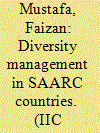

|
|
|
| 2 |
ID:
157794
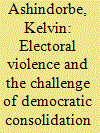

|
|
|
|
|
| Summary/Abstract |
Elections are the hallmarks of democracy; they also serve the purpose of peaceful change in government and confer political legitimacy on the government. Viewed from this prism, elections represent the expression of the sovereign will of the people. However, the conduct of elections in a plural society like Nigeria is often fraught with animosities and violence. Failing is the process to satisfy the test of popular participation and legitimacy. At the core of this bitter contest is the struggle for power by factional elite groups perceived as representing ethno religious and regional interest. Electoral seasons more than anytime else reveals the fragility and soft underbelly of the Nigerian state. The country’s electoral history is replete with narratives of flawed and disputed elections that have turned violent, resulting in numerous fatalities and reversing previous attempts at democratic consolidation. The 2015 general election was unprecedented in the annals of the country because for the first time an entrenched and incumbent party was defeated at the polls, and the country witnessed a peaceful alternation of power between contending political parties thereby fulfilling one of the preconditions for democratic consolidation. A tensed pre-election political atmosphere occasioned by the activities of the terrorist group, Boko Haram, that then controlled a large swath of Nigeria’s territory and a fragmented elite divided along ethno-religious and regional lines foreshadowed the election. Shuttle diplomacy by the United States secretary of state and the constitution of body called ‘National Peace Committee’ comprised of Kofi Anan, the immediate past secretary general of the United Nations, past presidents of Nigeria and leading clergymen and the postponement of the election date by six weeks before the electoral management body could deliver an election whose outcome was accepted by the contending political parties and averting the prediction of an apocalyptic endgame. This study seeks to engage the factors that make conduct of elections in Nigeria to be violent prone and undermine attempts at institutionalising a democratic tradition. The methodology is qualitative in approach, relying on secondary data from books, journal articles and newspaper commentaries.
|
|
|
|
|
|
|
|
|
|
|
|
|
|
|
|
| 3 |
ID:
128560
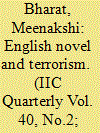

|
|
|
| 4 |
ID:
144622
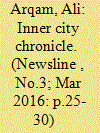

|
|
|
| 5 |
ID:
133829
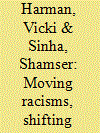

|
|
|
|
|
| Publication |
2014.
|
| Summary/Abstract |
As revealed by the 2011 Census, England is increasingly multi-ethnic. Yet, at the same time, racist discourses and practices continue to remain salient. In order to explore the contemporary manifestations of racism, this paper draws on research with two groups occupying different spaces within the sociology of race and ethnicity: young separated migrants seeking sanctuary in Britain and lone white mothers of mixed-parentage children. In this paper, we examine the everyday and structural racism experienced by each group in order to consider how seemingly different manifestations of race and racism are linked together and, in certain ways, dependent on each other. The paper argues that the public celebration of mixedness acts as a disavowal mechanism which can be used to conceal the endurance of colour-based racism as well as state racism operating legally through the immigration system.
|
|
|
|
|
|
|
|
|
|
|
|
|
|
|
|